🕣 Duration: 3 years
Building a Better Game: Supporting English Football from Grassroots to Elite
Building a Better Game: Supporting English Football from Grassroots to Elite
Building a Better Game: Supporting English Football from Grassroots to Elite
English Football Learning, the FA's official platform, supports players, coaches, referees, and football professionals with educational resources, training, certifications, and tools for skill development at all levels, from grassroots to elite.
English Football Learning, the FA's official platform, supports players, coaches, referees, and football professionals with educational resources, training, certifications, and tools for skill development at all levels, from grassroots to elite.

74%
74%
Increase in the average monthly page views during the first month after launch, compared to the average views from the previous learning site, measured between Sept – Oct 2022. A notable achievement for a new site.
Increase in the average monthly page views during the first month after launch, compared to the average views from the previous learning site, measured between Sept – Oct 2022. A notable achievement for a new site.
141%
141%
A 5.5 million increase in interactions with content by June 2023, since launch in Sept 2022. This represents 141% of our target.
A 5.5 million increase in interactions with content by June 2023, since launch in Sept 2022. This represents 141% of our target.
188%
188%
Increase in returning visitors: Due to valuable and easy access to learning materials.
Increase in returning visitors: Due to valuable and easy access to learning materials.
My Role
Year: 2021-2024
Role: Senior UX Designer
Team: Collaborated with 2 designers, 1 UX researcher, 2 PMs, and 3 engineers.
Responsibilities: Owned end-to-end UX design for English Football Learning, The FA's official education platform serving 25,000+ coaches, referees, and players nationwide. As part of a three-year engagement across multiple FA projects, I led this platform's transformation, partnering with product and engineering leadership to balance user needs with technical feasibility. Drove the complete design process—from thematic analysis and competitive research through interface design and usability testing.
Year: 2021-2024
Role: Senior UX Designer
Team: Collaborated with 2 designers, 1 UX researcher, 2 PMs, and 3 engineers.
Responsibilities: Owned end-to-end UX design for English Football Learning, The FA's official education platform serving 25,000+ coaches, referees, and players nationwide. As part of a three-year engagement across multiple FA projects, I led this platform's transformation, partnering with product and engineering leadership to balance user needs with technical feasibility. Drove the complete design process—from thematic analysis and competitive research through interface design and usability testing.
My Role
Year: 2021-2024
Role: Senior UX Designer
Team: Collaborated with 2 designers, 1 UX researcher, 2 PMs, and 3 engineers.
Responsibilities: Owned end-to-end UX design for English Football Learning, The FA's official education platform serving 25,000+ coaches, referees, and players nationwide. As part of a three-year engagement across multiple FA projects, I led this platform's transformation, partnering with product and engineering leadership to balance user needs with technical feasibility. Drove the complete design process—from thematic analysis and competitive research through interface design and usability testing.
Key Pain Points
Transform the legacy Bootroom platform into English Football Learning a platform.
Poor navigation and content structure caused users to abandon searches for training materials, directly impacting engagement and platform adoption.
The platform's imagery and content lacked diversity, creating barriers to adoption among underrepresented communities and failing to reflect The FA's commitment to inclusive football.
Key Pain Points
Transform the legacy Bootroom platform into English Football Learning a platform.
Poor navigation and content structure caused users to abandon searches for training materials, directly impacting engagement and platform adoption.
The platform's imagery and content lacked diversity, creating barriers to adoption among underrepresented communities and failing to reflect The FA's commitment to inclusive football.
STEP 2
UX Audit
STEP 2
UX Audit
Led a comprehensive analysis of the existing platform, including a UX audit and user journey mapping
to uncover friction points and define evidence-based priorities before recommending design changes.
Led a comprehensive analysis of the existing platform, including a UX audit and user journey mapping to uncover friction points and define evidence-based priorities before recommending design changes.
Led a comprehensive analysis of the existing platform, including a UX audit and
user journey mapping to uncover friction points and define evidence-based priorities
before recommending design changes.



STEP 3
Thematic Analysis: Identifying User Patterns
STEP 3
Thematic Analysis: Identifying User Patterns
I synthesised insights from user surveys, analytics, and the UX audit into a thematic analysis, identifying recurring patterns and friction points. These insights informed the creation of user personas and journey maps backed by data, ensuring design decisions directly addressed real user needs and improved experience clarity and efficiency.
I synthesised insights from user surveys, analytics, and the UX audit into a thematic analysis, identifying recurring patterns and friction points. These insights informed the creation of user personas and journey maps backed by data, ensuring design decisions directly addressed real user needs and improved experience clarity and efficiency.
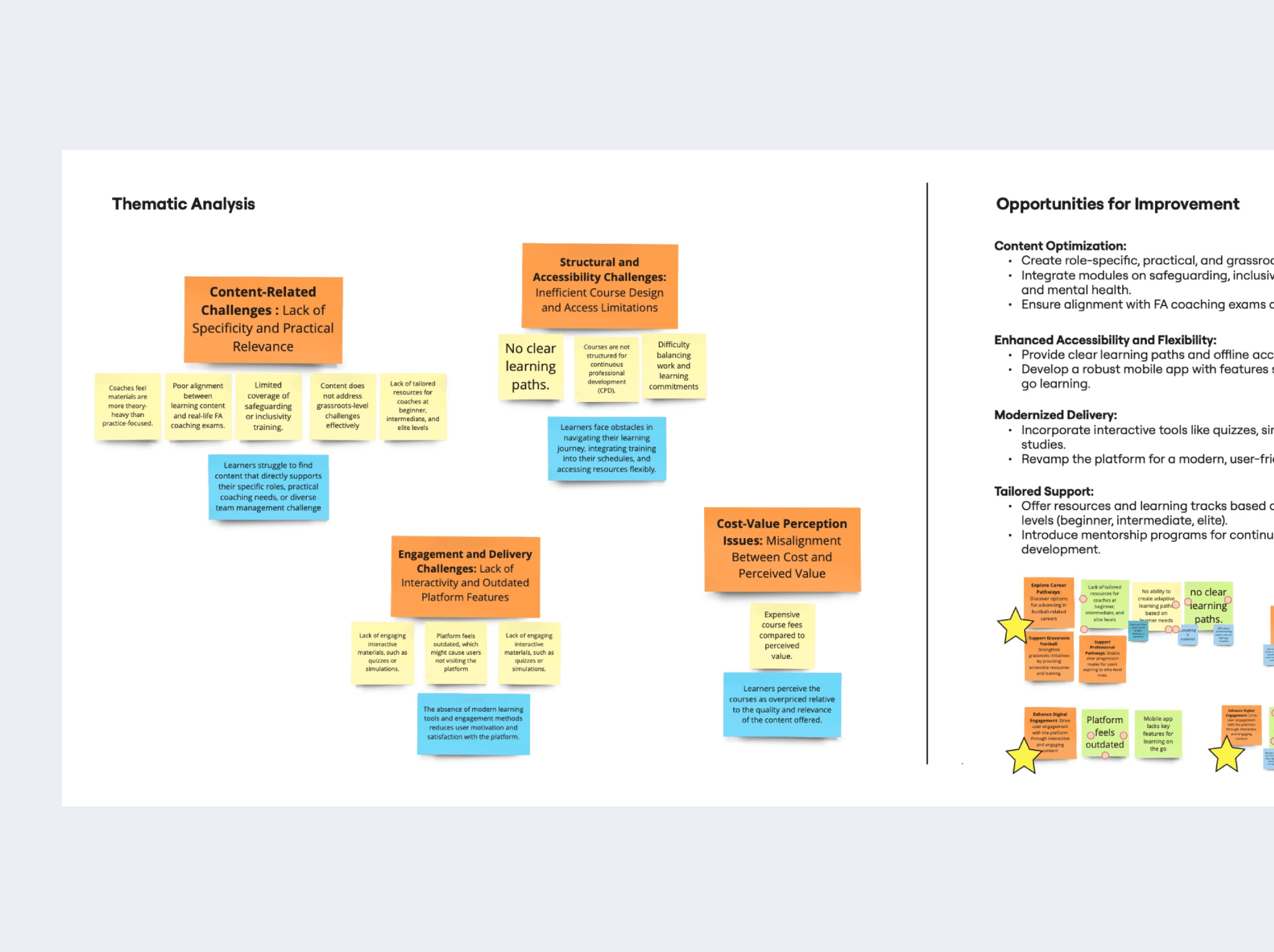


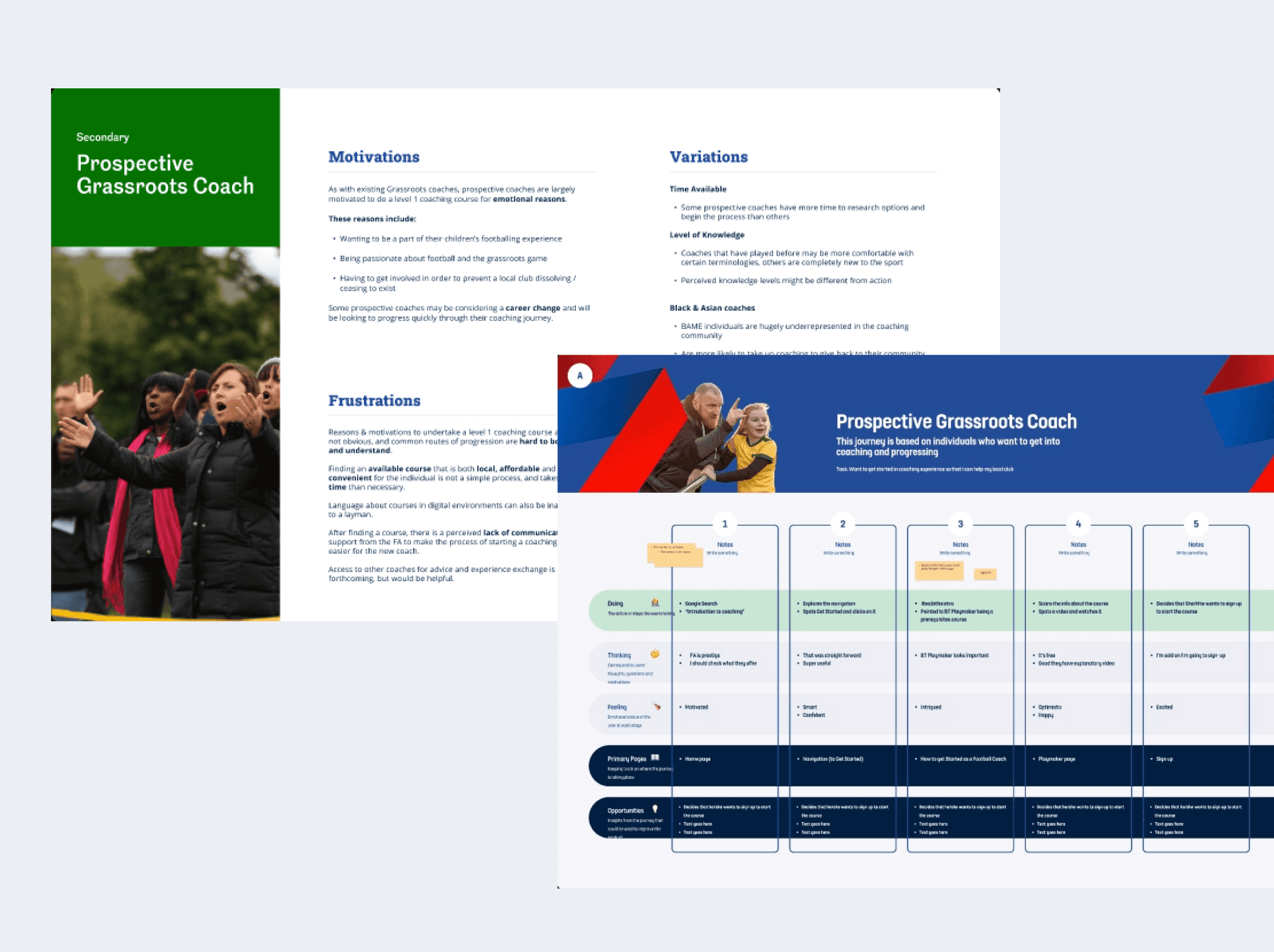


STEP 4
Defining Priorities
STEP 4
Defining Priorities
Working closely with the client and the design team, I created an priority table that outlined which features and sections would be prioritised for design and development. This ensured both teams stayed aligned on what to tackle first and why, balancing user needs with business goals.
Working closely with the client and the design team, I created an priority table that outlined which features and sections would be prioritised for design and development. This ensured both teams stayed aligned on what to tackle first and why, balancing user needs with business goals.
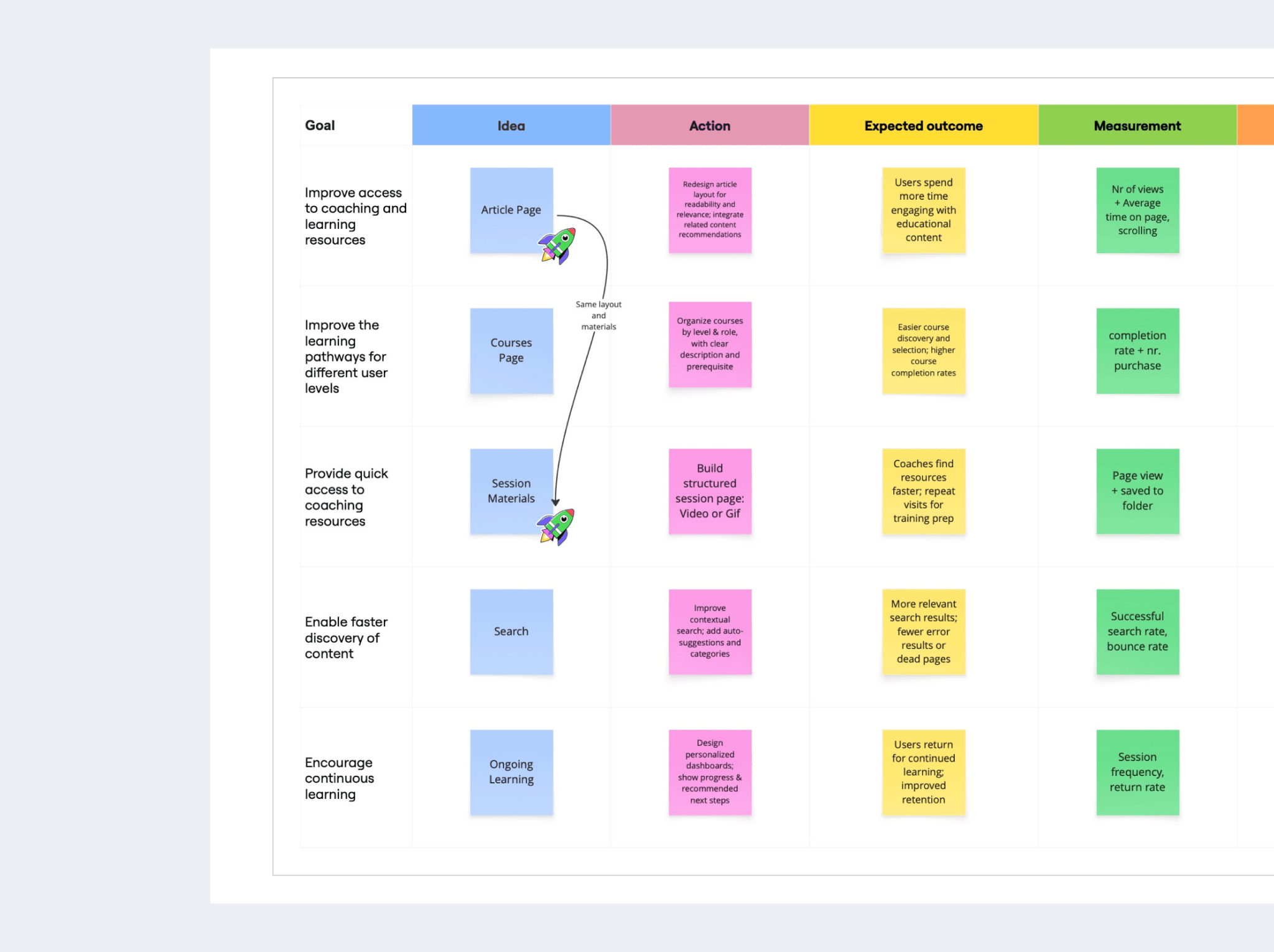


STEP 5
Design Exploration
STEP 5
Design Exploration
Building on the analysis, I translated research insights into wireframes and IA, defining core functionality guided by the priority table and user personas. Key components — Articles, Courses, Sessions, Profiles, Quizzes, Notifications, Menus, and Search, were designed to improve navigation, boost content discoverability, and increase engagement.
I translated mixed-method analysis insights
into a design strategy, securing business alignment on priority user journeys. I defined the platform's core functionality through
wireframe flows, supported by an Action Plan and Competitive Analysis. Key design areas included: Article, Courses, Sessions, Profile, Quizes, Notification, Menu, and Search.









STEP 6
Competitive Analysis
STEP 6
Competitive Analysis
To further refine the experience, I conducted a competitive analysis, identifying patterns and features from similar learning platforms that could improve usability and clarity. I shared these findings with the design team, and together we evaluated which ideas could be adapted effectively for our users. One noticeable feature was the Session Quiz and In-Page Quiz and tying it to the user profile.
To further refine the experience, I conducted a competitive analysis, identifying patterns and features from similar learning platforms that could improve usability and clarity. I shared these findings with the design team, and together we evaluated which ideas could be adapted effectively for our users. One noticeable feature was the Session Quiz and In-Page Quiz and tying it to the user profile.



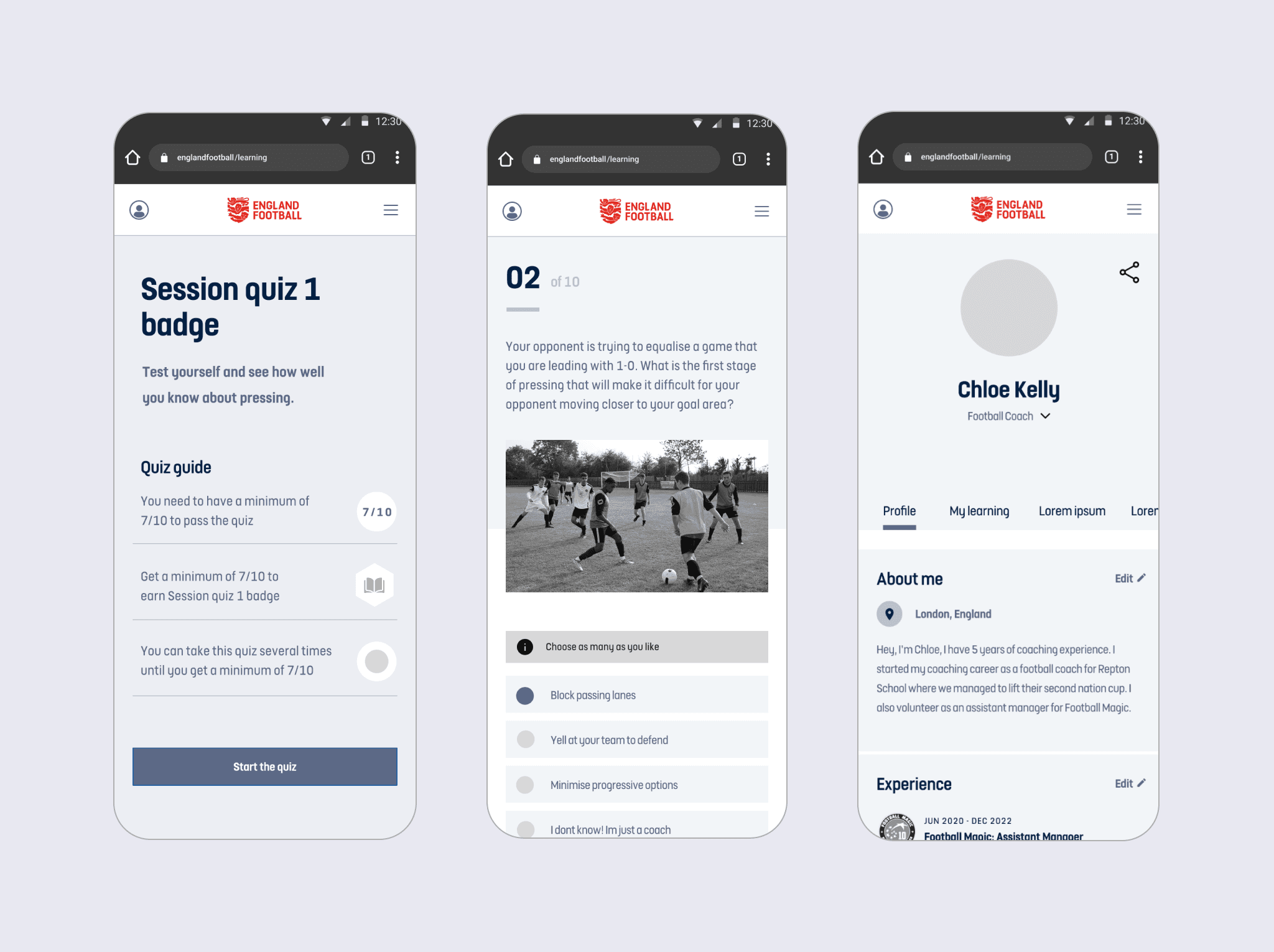


STEP 7
User Research
STEP 7
User Research
I collaborated with the User Researcher on usability testing, uncovering critical issues users missed the Get Started section and struggled with the floating menu. I captured detailed observations and follow-up insights, which directly informed design adjustments to improve discoverability and task completion.
I collaborated with the User Researcher on usability testing, uncovering critical issues users missed the Get Started section and struggled with the floating menu. I captured detailed observations and follow-up insights, which directly informed design adjustments to improve discoverability and task completion.
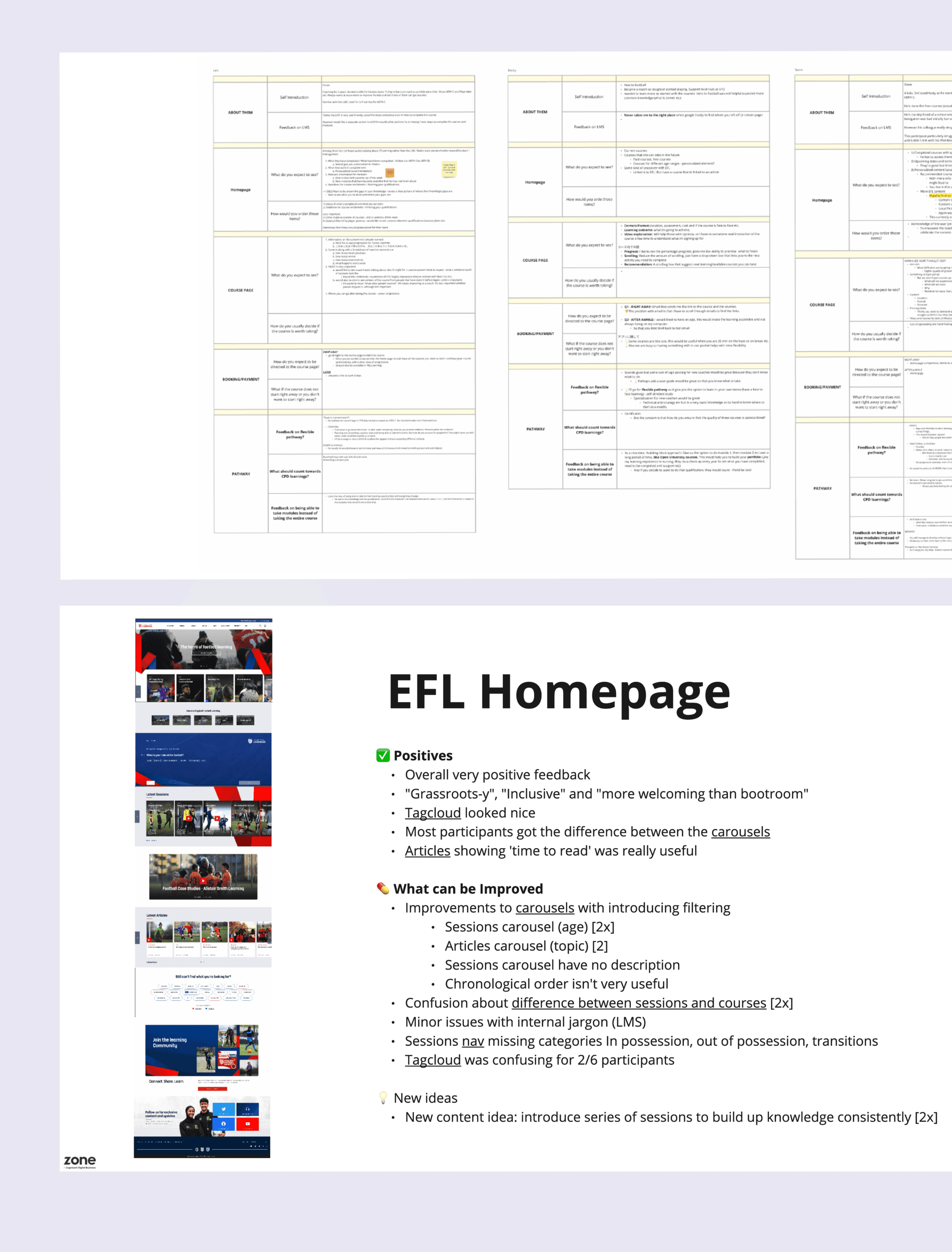


STEP 8
Improvements After Research
STEP 8
Improvements After Research
Following user research, we made several design improvements that had a significant impact on the overall experience — most notably the filtering system.
Following user research, we made several design improvements that had a significant impact on the overall experience — most notably the filtering system.
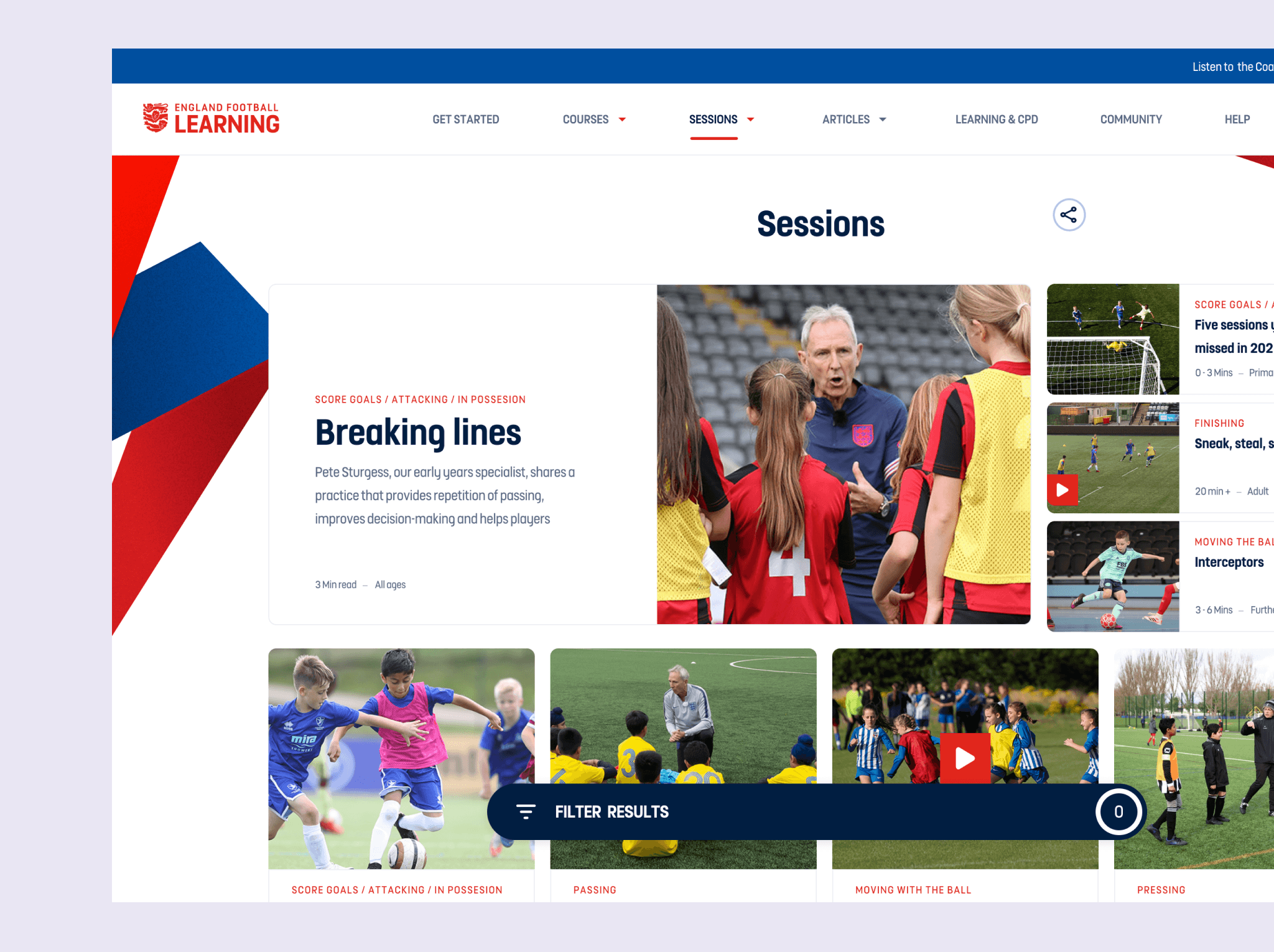


BEFORE: Floating Filter Menu
We increased the Session page's layout for more content, but it performed poorly. Only 7/10 desktop users located the floating filter, and 3 of those 7 struggled with the exact location. We then implemented a traditional sidebar filter menu. A follow-up study showed significantly higher performance with a 10/10 success rate in user task completion.



After: Sidebar Filter Menu
We first tested a floating filter to maximise content space, but only 7/10 users located it easily. Switching to a sidebar filter improved task completion to 10/10 — showing that visibility outweighed minimalism and informing our design system to favour discoverability over visual simplicity.
STEP 9
Continuous Refinement
STEP 9
Continuous Refinement
Following the website’s launch, I continued to look for ways to improve performance and user experience. This included regular Q&A sessions with engineers, running web performance analyses, and collaborating with the data team to identify new opportunities for optimisation.
Following the website’s launch, I continued to look for ways to improve performance and user experience. This included regular Q&A sessions with engineers, running web performance analyses, and collaborating with the data team to identify new opportunities for optimisation.






Final Design



Personalise Your Learning: A homepage tailored to user objectives.
Personalise Your Learning: A homepage tailored to user objectives.



Interactive Learning: An engaging and enjoyable way to quickly gain informal knowledge.
Interactive Learning: An engaging and enjoyable way to quickly gain informal knowledge.



Learner Profile: A central reference point that connects users to relevant content across the entire FA learning ecosystem and professional network building.
Learner Profile: A central reference point that connects users to relevant content across the entire FA learning ecosystem and professional network building.



“Thanks for all your hard work across all our projects Anthony - Its been a pleasure working with you and having your input into our calls. Your work goes unseen to us on the business side.”
“Thanks for all your hard work across all our projects Anthony - Its been a pleasure working with you and having your input into our calls. Your work goes unseen to us on the business side.”
Nick Baker, Senior Lead of Education, The Football Association (The FA)
“I wanted to express our heartfelt gratitude for the exceptional work you have contributed for the past three years. Your dedication, creativity and expertise in UX has been instrumental in our success and set a standard here at FA.”
“I wanted to express our heartfelt gratitude for the exceptional work you have contributed for the past three years. Your dedication, creativity and expertise in UX has been instrumental in our success and set a standard here at FA.”
Amre Basama, Product Owner, The Football Association (The FA)
Trade-Offs
Trade-Offs
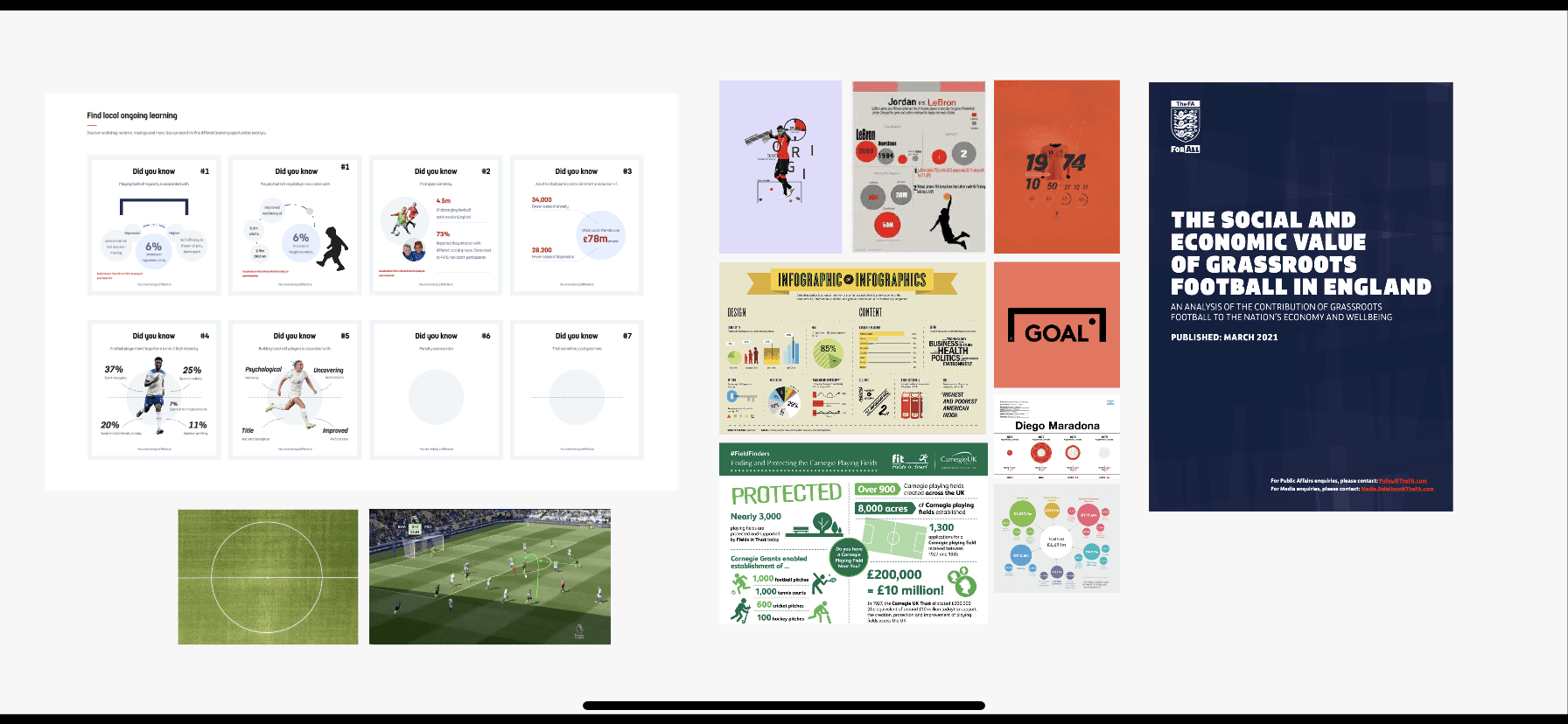


Interactive Infographic
We explored multiple strategies to boost member engagement and encourage continuous learning. However, work on this specific design was later halted due to maintenance concerns.
We explored multiple strategies to boost member engagement and encourage continuous learning. However, work on this specific design was later halted due to maintenance concerns.
Reflection and Key Takeaways
Reflection and Key Takeaways
Work backward Approach: I followed a "work backward" approach, starting with an audit of existing research and reusable design system components. This methodology ensured my design solutions were grounded in data and maximised the use of existing resources, resulting in a faster project timeline and a more consistent platform experience.
Grounded Communication: Learned how to stay grounded with ideas. Having open communication and support from clients, developers and designers made me comfortable suggesting ideas while being empathic to everyone's needs.
Working with the Marketing team: I learned to effectively align design standards with the company's broader learning platforms, ensuring cross-platform consistency. See Youtube
Work backward approach: By checking existing research and reusable parts of the platform before starting a new design. This ensured all solutions were based on facts, sped up the project, and kept the platform consistent.
Grounded Communication & Empathy: Learned how to stay grounded with ideas. Having open communication
and support from clients, developers (devs), and designers made me comfortable suggesting ideas while being empathic to everyone's needs.


If you need to hear the amazing story behind the
project, don't be a stranger and reach out
Anthony.kellly@gmail.com
If you need to hear the amazing story behind the
project, don't be a stranger and reach out
Anthony.kellly@gmail.com
“Thanks for all your hard work across all our projects Anthony - Its been a pleasure working with you and having your input into our calls. Your work goes unseen to us on the business side.”
Nick Baker, Senior Lead of Education, The Football Association (The FA)
“I wanted to express our heartfelt gratitude for the exceptional work you have contributed for the past three years. Your dedication, creativity and expertise in UX has been instrumental in our success and set a standard here at FA.”
Amre Basama, Product Owner, The Football Association (The FA)
STEP 1
Client workshop
The project began with a series of client briefings and workshops that helped our design team understand the users, business goals, and the wider project vision. These sessions gave us the clarity needed to prioritise objectives early and set a shared direction for the design phase.


STEP 1
Client workshop
The project began with a series of client briefings and workshops that helped our design team understand the users, business goals, and the wider project vision. These sessions gave us the clarity needed to prioritise objectives early and set a shared direction for the design phase.
